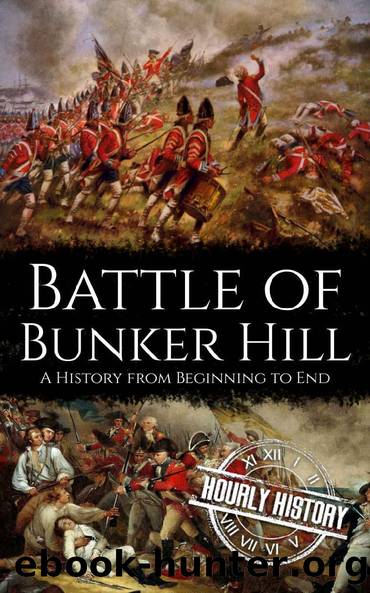Battle of Bunker Hill: A History from Beginning to End (American Revolultion Battles Book 1) by Hourly History

Author:Hourly History [History, Hourly]
Language: eng
Format: epub
Published: 2020-01-12T00:00:00+00:00
Chapter Six
Battle Analysis
âIt is not a field of a few acres of ground, but a cause, that we are defending, and whether we defeat the enemy in one battle, or by degrees, the consequences will be the same.â
âThomas Paine
There has been significant analysis of this battle throughout the years. Many historians have noted the missteps made by both sides which, had they not occurred, could have altered the outcome of the battle. Additionally, some of the participants in the battle later wrote of mistakes or misconduct. In one notable case, American General Dearborn published an account of the battle in Port Folio magazine years after General Israel Putnam had died. In his article, Dearborn accused General Putnam of cowardly leadership and failing to supply reinforcements.
At the time, people were shocked by the rancor of his attack, which prompted a forceful response from Putnamâs defenders, including John and Abigail Adams. Historians have noted that Dearbornâs account included numerous misstatements, some of which were outright inventions, and they have also noted that when Dearborn wrote this account, he was in some trouble himself. He was relieved of a top command because of mistakes in the War of 1812, and he became the first presidential cabinet nomination to be voted down by the Senate. Thus, his account may have been an attempt at distraction from his own troubles.
As for the American missteps on which historians agree, one important problem was that General Putnam and Colonel Prescott, both of whom were leaders in the field, frequently acted independently. This had strategic implications as it was Prescottâs decision to go against orders and fortify Breedâs Hill rather than Bunker Hill that provided a greater provocation for the British offensive since it put colonial artillery closer to Boston. Additionally, his decision meant that the colonial forces were more at risk of being trapped since, if the British had sought to take control of Charlestown Neck, they would not have been able to properly defend against it. Fortunately for the colonial forces, the British didnât make that decision.
Another problem among the colonial forces was that, while the front lines were well managed, only some of the militias obeyed General Wardâs and General Putnamâs authority; others disobeyed and stayed on Bunker Hill instead of defending Breedâs Hill against the third British assault. General Prescott believed that the third assault would have also been repulsed had he received troop reinforcements and supplies of ammunition in the redoubt. In fact, for their refusal to obey orders, several officers were court-martialed and subsequently dismissed from command. Still, while there were elements of disorganization among the colonial forces, they fought well against the best-trained military in the world at the time.
As for the British military missteps, one problem was that they acted slowly after spotting the colonial works on Breedâs Hill. They were reportedly ready for action by 2 pm, but it wasnât until later that the Lively first opened fire. That gave the colonial forces time to reinforce their flanks. Additionally,
Download
This site does not store any files on its server. We only index and link to content provided by other sites. Please contact the content providers to delete copyright contents if any and email us, we'll remove relevant links or contents immediately.
| Africa | Americas |
| Arctic & Antarctica | Asia |
| Australia & Oceania | Europe |
| Middle East | Russia |
| United States | World |
| Ancient Civilizations | Military |
| Historical Study & Educational Resources |
The Light of Days by Judy Batalion(1108)
First Platoon: A Story of Modern War in the Age of Identity Dominance by Annie Jacobsen(962)
Stalin's War: A New History of World War II by Sean McMeekin(895)
The Pacific War 1941-1943 by James Holland(831)
Walk in My Combat Boots by James Patterson(793)
The American War in Afghanistan by Carter Malkasian(776)
Victory's Price (Star Wars) by Alexander Freed(760)
The Vietnam War: An Intimate History by Geoffrey C. Ward & Ken Burns(759)
Blood and Ruins: The Great Imperial War, 1931-1945 by Richard Overy(730)
Operation Pedestal by Max Hastings(711)
Concepts of Space by Jammer Max;(693)
Extreme Fitness by Chris McNab(692)
Cold War (Alexander King Book 2) by Bradley Wright(691)
The Madman Theory by Jim Sciutto(674)
Flying Tiger by Samson Jack(664)
World War II Infantry Fire Support Tactics by Gordon L. Rottman(644)
Pathfinders by AL-KHALILI JIM(638)
Bismarck by Jean-Paul Bled(626)
Panzerkrieg by Mike Syron(623)
